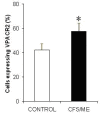Immunological abnormalities as potential biomarkers in Chronic Fatigue Syndrome/Myalgic Encephalomyelitis
- PMID: 21619669
- PMCID: PMC3120691
- DOI: 10.1186/1479-5876-9-81
Immunological abnormalities as potential biomarkers in Chronic Fatigue Syndrome/Myalgic Encephalomyelitis
Abstract
Background: Chronic Fatigue Syndrome/Myalgic Encephalomyelitis (CFS/ME) is characterised by severe prolonged fatigue, and decreases in cognition and other physiological functions, resulting in severe loss of quality of life, difficult clinical management and high costs to the health care system. To date there is no proven pathomechanism to satisfactorily explain this disorder. Studies have identified abnormalities in immune function but these data are inconsistent. We investigated the profile of markers of immune function (including novel markers) in CFS/ME patients.
Methods: We included 95 CFS/ME patients and 50 healthy controls. All participants were assessed on natural killer (NK) and CD8(+) T cell cytotoxic activities, Th1 and Th2 cytokine profile of CD4(+) T cells, expression of vasoactive intestinal peptide receptor 2 (VPACR2), levels of NK phenotypes (CD56(bright) and CD56(dim)) and regulatory T cells expressing FoxP3 transcription factor.
Results: Compared to healthy individuals, CFS/ME patients displayed significant increases in IL-10, IFN-γ, TNF-α, CD4(+)CD25(+) T cells, FoxP3 and VPACR2 expression. Cytotoxic activity of NK and CD8(+) T cells and NK phenotypes, in particular the CD56(bright) NK cells were significantly decreased in CFS/ME patients. Additionally granzyme A and granzyme K expression were reduced while expression levels of perforin were significantly increased in the CFS/ME population relative to the control population. These data suggest significant dysregulation of the immune system in CFS/ME patients.
Conclusions: Our study found immunological abnormalities which may serve as biomarkers in CFS/ME patients with potential for an application as a diagnostic tool.
Figures







References
-
- Fukuda K, Straus SE, Hickie I, Sharpe MC, Dobbins JG, Komaroff A. The chronic fatigue syndrome: a comprehensive approach to its definition and study. International Chronic Fatigue Syndrome Study Group. Ann Intern Med. 1994;121(12):953–959. - PubMed
-
- Arnett SV, Alleva LM, Korossy-Horwood R, Clark IA. Chronic fatigue syndrome - A neuroimmunological model. Med Hypotheses. 2011. - PubMed
Publication types
MeSH terms
Substances
LinkOut - more resources
Full Text Sources
Other Literature Sources
Medical
Research Materials

